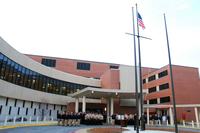The American counter-insurgency in Iraq is reaching new heights, the New York Times reports.
In Saddam's hometown, Tikrit, "commanders called in AC-130 gunships, A-10 attack planes and Apache helicopter gunships, as well as Air Force F-16 and F-15E fighter-bombers with 500-pound bombs, the military said, in the largest bombardment in the area since President Bush declared the end of major combat on May 1."
Meanwhile, U.S. forces called in air strikes "against targets in central Baghdad for the first time since the Spring," Channel News Asia notes.
Major General Charles Swannack, who leads the 82nd Airborne, says the stepped-up offensive "demonstrates our resolve, and we are not going to fight this one with one hand tied behind our backs."
But the Salt Lake City Tribune notes that "a top-secret CIA assessment from Iraq, widely reported last week, has warned that such aggressive counterinsurgency tactics by the army could incite more Iraqis to fight the Americans."
With their gruesome acts, terrorist-type insurgent groups (think Hamas, or Peru's Sendero Luminoso) traditionally try to provoke the government into ever-more repressive responses. The more heavy-handed the government is, the theory goes, the more the populace is radicalized, and the more ripe for revolution the area becomes.
Does that mean, then, the the U.S. offensive is playing into the bad guys' hands? Do American military commanders have any other choice?
THERE'S MORE: On the other end of the tactical spectrum, "the decision to pull the U.S. Army's 82nd Airborne Division out of the 'Sunni Triangle' city of Ramadi and to turn local security over to Iraqi officers might be the most significant step since the U.S.-led occupation began six and a half months ago," Slate's Fred Kaplan says. "If the Ramadi experiment succeeds, it could serve as the road map to a responsible exit strategy. If it fails, it will dramatize the depths of our predicament, the utter lack of good options, the tenacity of the dare we say it? quagmire that bogs us down."
AND MORE: "The U.S. Air Force used some of the largest weapons in its inventory to attack targets in central Iraq," according to the Associated Press.
"A pair of 2,000-pound satellite-guided bombs were dropped late Tuesday near Baqouba, 30 miles northeast of Baghdad, on 'camps suspected to have been used for bomb-making,' said Maj. Gordon Tate, a spokesman for the 4th Infantry Division."
WILL AGGRO TACTICS IN IRAQ WORK?
© Copyright 2024 Military.com. All rights reserved. This article may not be republished, rebroadcast, rewritten or otherwise distributed without written permission. To reprint or license this article or any content from Military.com, please submit your request here.







